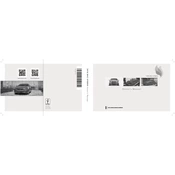Lincoln MKZ Hybrid 2019 Owner's Manual


The Lincoln MKZ Hybrid 2019 should have regular maintenance checks every 5,000 to 7,500 miles, which include oil changes, tire rotations, and brake inspections. Always refer to the owner's manual for specific intervals and procedures.
To reset the oil change indicator, turn the ignition to the 'on' position without starting the engine. Press the 'Settings' button on the steering wheel, navigate to 'Vehicle', then 'Oil Life Reset', and hold 'OK' until the oil life resets to 100%.
If the vehicle is not starting, check the battery connections and ensure they are clean and tight. Verify that the key fob has a good battery. If issues persist, consult a certified technician to inspect the starter and electrical system.
To improve fuel efficiency, maintain proper tire pressure, drive smoothly, reduce excess weight, and keep up with regular maintenance. Using the Eco mode can also help optimize fuel consumption.
The Lincoln MKZ Hybrid 2019 typically requires SAE 5W-20 synthetic blend motor oil. Always check the owner’s manual for the recommended oil type and specifications.
To pair your smartphone, enable Bluetooth on your phone, then press the 'Phone' button on the SYNC system. Select 'Add Device' and follow the on-screen instructions to complete the pairing process.
If the check engine light appears, ensure the gas cap is securely tightened. If the light remains on, have a diagnostic test performed by a qualified technician to identify and resolve the issue.
The Lincoln MKZ Hybrid 2019 is designed to run on regular unleaded gasoline with an octane rating of 87. Always refer to the owner’s manual for fuel recommendations.
To replace a flat tire, park the car on a flat surface, engage the parking brake, and place wheel wedges. Use the jack to lift the car, remove the lug nuts, replace the tire, and tighten the lug nuts in a crisscross pattern. Lower the car and ensure all nuts are secure.
Common causes of brake noise include worn brake pads, warped rotors, or debris caught in the brake components. Regular inspections and maintenance can help prevent these issues. If noise persists, consult a qualified technician.